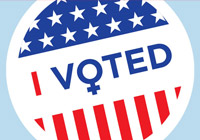The voter didn’t want to talk.
Could I speak with his wife?
She’s not home, he said.
Voter registration printouts showed he was a Republican, but that his wife was a Democrat. It was shortly before last November’s midterm election, and I was a volunteer canvassing in Tustin for Katie Porter, a Democrat running for the House of Representatives.
The man said firmly: I don’t discuss my political views.
He did not open his screen door.
Well, would you give this flyer about Katie Porter to your wife?
He cracked the door slightly and accepted the flyer, reluctantly. But as I turned to leave, he stepped outside. You know, he said, that new tax law is really going to hurt me. I won’t be able deduct a big chunk of my property taxes anymore.
The legislation, supported by Republicans and approved by Congress in 2017, imposed new limits on state and local taxes eligible for deduction on federal returns. The law hits hardest in states with high property values, like California.
Notably, it was not the man’s thoughts about President Trump that made him break the ice. Or his thoughts about the national economy. Or about Syria. Or North Korea. Or immigration. Not even his thoughts about the wall. What prompted him to speak up was something personal. He wanted to talk about his own tax bill.
Professors, politicians and policymakers like to view elections, and the issues that drive them, from 20,000 feet: The economy. Foreign affairs. The environment. What I learned walking the streets and punching doorbells over several months last year is that real politics happens on the ground, rarely higher than voters are tall. The late House Speaker Tip O’Neill was famous for saying that all politics is local. In fact, it’s granular.
It is not even house by house; it’s person by person. Individual. The Tustin homeowner was registered in one party and had particular concerns. In addition to his taxes, they included the Affordable Care Act and offshore oil drilling. His wife was registered in another party. Had she been at home, she might have voiced some of his interests. But more likely she would have emphasized concerns of her own.
Experts think large: about statistics, demographics, surveys. Voters are more nuanced. Many of their likes and dislikes, especially their frustrations and disappointments, don’t show up in polls. But they become evident on doorsteps, and they are as numerous and different as the places I visited and the people I spoke with.
In Palmdale, my husband, David, and I canvassed for Katie Hill, a Democratic newcomer running for Congress. When we knocked on one door, a woman in her late 60s opened it wearing only a bath towel and a shower cap.
She was racing to a friend’s funeral.
Did she have time to talk?
She did – enough time to share her disgust about Trump and what he was doing to civic values. She said she was eager to vote Democratic, for Katie Hill.
At another home in Palmdale, we were met on the front lawn by an African-American man who was a retired school bus driver. We didn’t have to tell him that it was important to flip the House and constrain the President.
He told us.
In Chino Hills, I trudged up a street one hot Sunday, dripping with sweat. A middle-aged white woman was weeding her rose garden. She put down her trowel.
She said she was furious – and sad – about kids: the ones the Trump administration had separated from their parents at the border.
Especially the toddlers, she said.
This is not who we are as Americans, she added. Then she went back to her roses.
At an apartment complex near UC Irvine, an Asian-American student stood in the doorway of his sparsely-furnished unit. He was worried about health insurance when he finished graduate school.
If Republicans continue to destabilize the Affordable Care Act, he said, then he won’t be able to pay his doctor.
Little is more personal than one’s wallet, and pocketbook issues can cut both ways.
What’s your opinion of President Trump? my husband asked a man in Santa Clarita, who appeared to be about 55. He was a Democrat.
I like him a lot, the man said. My 401K has shot up. He has made a fortune for me in just a year.
Among the things I learned as a canvasser were: Never be surprised. Listen more than you talk. Meet people where they are. Issues divide, but values often don’t.
Almost all of the conversations I had were interesting. I tried to persuade people to vote for Democrats. Often that went against their party affiliation. Nonetheless, our discussions were remarkable for their civility.
Often, when I shook hands with voters before I walked back down their front steps, I felt as if we’d had that rarest of experiences:
A mutually respectful talk about politics.
























